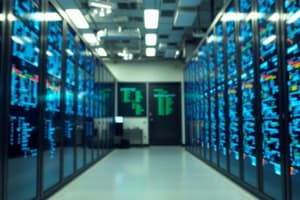Podcast
Questions and Answers
What are the five components of an information system according to Peter Senge's framework?
What are the five components of an information system according to Peter Senge's framework?
The five components are hardware, software, data, procedures, and people.
Define raw data and its significance in information systems.
Define raw data and its significance in information systems.
Raw data refers to unprocessed facts and figures generated by a system, which serves as the foundation for creating useful information.
Explain the concept of timeliness in the context of information systems.
Explain the concept of timeliness in the context of information systems.
Timeliness means that information should be available when needed to be effective in decision-making.
What distinguishes accuracy from completeness in information systems?
What distinguishes accuracy from completeness in information systems?
Describe the three levels of the information system pyramid.
Describe the three levels of the information system pyramid.
What role do computer resources play in supporting organizational processes?
What role do computer resources play in supporting organizational processes?
How does the strategic information system framework align with an organization's goals?
How does the strategic information system framework align with an organization's goals?
What is the importance of reliability in an information system?
What is the importance of reliability in an information system?
How do cloud services enhance collaboration in businesses?
How do cloud services enhance collaboration in businesses?
What role does CRM play in improving customer relationships?
What role does CRM play in improving customer relationships?
In what ways do data analytics enhance decision-making in organizations?
In what ways do data analytics enhance decision-making in organizations?
What are some applications of AI in optimizing supply chains?
What are some applications of AI in optimizing supply chains?
How does the Internet of Things (IoT) contribute to global business operations?
How does the Internet of Things (IoT) contribute to global business operations?
What is the impact of predictive analytics on business decision-making?
What is the impact of predictive analytics on business decision-making?
Describe how edge computing improves operational efficiency.
Describe how edge computing improves operational efficiency.
How does business intelligence (BI) convert data into actionable insights?
How does business intelligence (BI) convert data into actionable insights?
What are the main roles of file servers, application servers, and web servers in modern information systems?
What are the main roles of file servers, application servers, and web servers in modern information systems?
Explain the significance of scalability and redundancy in server architectures.
Explain the significance of scalability and redundancy in server architectures.
What advantages does cloud computing offer compared to traditional IT infrastructure?
What advantages does cloud computing offer compared to traditional IT infrastructure?
How does resource allocation impact an organization's efficiency and effectiveness?
How does resource allocation impact an organization's efficiency and effectiveness?
Why is Charles Babbage referred to as the 'father of the computer'?
Why is Charles Babbage referred to as the 'father of the computer'?
What was the significance of Fortran in the development of programming languages?
What was the significance of Fortran in the development of programming languages?
What was the primary function of the abacus, and why is it significant in the history of computing?
What was the primary function of the abacus, and why is it significant in the history of computing?
Describe the contributions of Ada Lovelace to early computing.
Describe the contributions of Ada Lovelace to early computing.
What impact did UNIX have on future operating systems?
What impact did UNIX have on future operating systems?
What impact did early punch card systems have on data processing?
What impact did early punch card systems have on data processing?
How did ARPANET contribute to the formation of the modern internet?
How did ARPANET contribute to the formation of the modern internet?
In what manner has e-commerce transformed business practices?
In what manner has e-commerce transformed business practices?
What role do electronic health records (EHRs) play in healthcare?
What role do electronic health records (EHRs) play in healthcare?
What advancements have computers brought to the entertainment industry?
What advancements have computers brought to the entertainment industry?
What potential applications does quantum computing have?
What potential applications does quantum computing have?
How has education been transformed by the use of computers?
How has education been transformed by the use of computers?
What is a key ethical concern regarding data collection in advanced computing technologies?
What is a key ethical concern regarding data collection in advanced computing technologies?
How can AI algorithms unintentionally become biased?
How can AI algorithms unintentionally become biased?
What major risk does advanced technology pose in relation to cybersecurity?
What major risk does advanced technology pose in relation to cybersecurity?
What is a predicted key theme in the evolution of quantum computing?
What is a predicted key theme in the evolution of quantum computing?
In what ways is AI expected to impact the healthcare sector?
In what ways is AI expected to impact the healthcare sector?
What do ethical AI regulations focus on to ensure responsible AI development?
What do ethical AI regulations focus on to ensure responsible AI development?
What is parallel computing, and why is it pursued?
What is parallel computing, and why is it pursued?
Differentiate between task parallelism and data parallelism.
Differentiate between task parallelism and data parallelism.
Flashcards are hidden until you start studying
Study Notes
Information Systems Overview
- Information systems are collections of hardware, software, data, procedures, and people working together.
- Distinction between raw data (unprocessed facts) and processed information.
- Information technology encompasses the technology and applications used in everyday transactions.
Types of Systems and Their Characteristics
- Accuracy: Information should closely reflect reality.
- Timeliness: Information must be available when needed for effectiveness.
- Completeness: Must provide a full picture of the subject matter.
- Reliability: Information should be dependable and consistent.
- Relevance: Information should be pertinent to ongoing tasks and decisions.
Frameworks for Understanding Information Systems
- Various frameworks assist in structuring and conceptualizing information systems.
- Five Components Framework: Includes hardware, software, data, procedures, and people (Peter Senge).
- Information System Pyramid: Categorizes systems into operational, managerial, and executive levels.
- Strategic Information System Framework: Aligns system capabilities with organizational strategic goals and competitive advantage.
Components of Information Systems
- Hardware: Physical devices (computers, servers) that facilitate data processing.
- Software: Programs and applications that enable data manipulation.
- Data: Raw facts and figures that form the foundation for information.
- Procedures: Sets of instructions for managing data and decision-making.
- People: Users, analysts, developers, and personnel involved in the information system lifecycle.
Impact of Computer Resources
- Computer resources enable organizational processes and decision-making.
- Critical for automation, data management, and communication.
- Enhances operational efficiency through systems like ERP and CRM.
- Cloud services facilitate collaboration and information sharing.
Trends and Emerging Technologies
- Artificial Intelligence (AI): Enhances automation, decision support, and personalization in marketing.
- Internet of Things (IoT): Connects devices to improve data collection and analysis.
- Edge Computing: Reduces latency by processing data closer to the source.
Historical Milestones in Computing
- Charles Babbage: Known as the "father of the computer," envisioned the Analytical Engine.
- Early Devices: Abacus (2700-2300 BCE) for basic arithmetic, Babbage's Analytical Engine (19th century) for complex calculations.
- Ada Lovelace: Regarded as the first computer programmer, contributed algorithms for the Analytical Engine.
- Punch Card Systems: Popularized in the late 19th century for data processing.
Significant Developments in Computer Science
- Programming Languages: Fortran (1957) as the first high-level language; C (1972) as a foundational language.
- Operating Systems: UNIX (1969) as an early influential OS; Microsoft Windows (1985) leading in PC market.
- Internet Development: ARPANET (1969) as a precursor to the internet; World Wide Web in the 1990s.
Societal Impacts of Computing
- Business: Automation revolutionizes accounting, inventory, and customer service; e-commerce expands global connectivity.
- Education: E-learning platforms and resources democratize information access for learning.
- Healthcare: Electronic health records improve patient care; advancements in medical imaging support disease detection.
- Entertainment: Computers enable digital media, video games, and streaming services.
Contemporary Developments and Future Trends
- Quantum Computing: Utilizes quantum physics to offer advanced processing methods; applications include drug discovery and cryptography.
- Ethical Considerations: Focus on privacy, AI bias, and cybersecurity in the age of advanced technologies.
- Future Trends: Anticipate maturity in quantum computing, increased AI integration in healthcare, and the establishment of ethical AI regulations.
- Parallel Computing: Enhances performance via multi-core processors, enabling concurrent execution of tasks for efficiency.
Studying That Suits You
Use AI to generate personalized quizzes and flashcards to suit your learning preferences.




